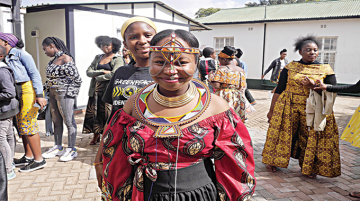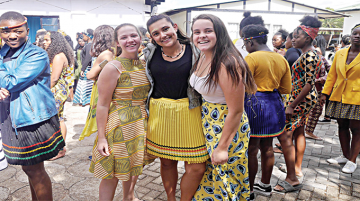Africa’s identity crisis

Kudzai Chikiwa, Showbiz Reporter
Learners at most schools yesterday celebrated Africa Day by wearing colourful African attires.
The attires ranged from traditional to modern with most girls donning African pencil dresses, print skirts, trousers, jumpsuits and playsuits. Some boys on the other hand, wore Nigerian dashiki (a colourful garment for men that covers the top half of the body which has beautiful embroidery around the neck area).
By merely looking at the pupils, one would assume that the young minds were carrying the African identity. The sad story is that’s not the case as “identity crisis” is real and today’s Africans are living as carbon copies of the West as colonisers left a stamp of their culture that we are failing to brush off.
This identity crisis ranges from our dressing, food, music and the literature we consume.
Random interviews with secondary school children showed that the majority of them do not know their village origin, their tribe or totems.

“I’ll have to ask daddy about that because I’ve never heard of it (totem). But I often visit my grandparents at their farm in Nyamandlovu.
“You know this issue of totems is backward because it was important during the ancient times,” Caroline Ndlovu, a Form Four pupil responded when she was asked about her totem.
Another, Nqobizitha Moyo said he does not know much about his origins as he no longer goes to their rural home in Tsholotsho.
“Since my grandparents passed on 10 years ago, I never went to the rural areas. When we want to hold a family gathering, people come to our house nowadays because my dad is the oldest in their family.
“As much as we have these family gatherings, we never talk about family origins and all as we (kids) mostly focus on our everyday lives and struggles,” he said.

This is the reality about Africa. In as much as we celebrate liberty from the colonial man and take pride in being Africans, some of us have lost the values that our ancestors fought for.
Back then, our ancestors owed their very being to the village setup. Today, our pride is in the leafy suburbs as some kids can grow to be teenagers without having bumped into an ox.
Explaining how our culture is slowly being eroded, 85-year-old granny Gugulethu Ndebele said there is no longer constant communication between the old and new generation.
“Long back, we knew that in the evening, children would gather around a fire and listen to stories from elders. It’s through storytelling that they learnt about their village of origin, history, sacred beliefs and everything.
“Today’s children do not even visit their grandparents ekhaya. If they do, you just see them browsing on their smart phones. The new technologies have stolen ubuntu from our children,” she said.
Ninety-year-old Mandla Ngwenya said modern parents are responsible for the erosion of our culture. “I’ve seven children and all of them have Ndebele names because I’m proud to be one. Everything that’s associated with my name has to reflect my identity but that’s not the case with these modern parents.
“All their children have some strange names which sometimes don’t even have meaning. Some children even change names on Facebook because they’ll be shy to associate themselves with names which their parents will have given them,” Ngwenya said.
Traditional meals, Ngwenya said, are no longer being served by modern parents
“Today’s children don’t know our African dishes. On special occasions, parents take their children to have pizza, to Chicken Inn and to eat ice cream. Parents need to teach children about our food and how to prepare it because it helps them understand our culture,” he said.
A youthful Marvelous Nyoni said in as much as today’s generation appreciates African culture, there is need for the elderly to also appreciate that the world is transforming every day.
“It’s not that we’re no longer proud of who we are but we can’t be living the same way as our ancestors. The world is changing and we need to catch up with others.
“Imagine me going to study in the US while I know nothing about the lifestyle of the people in that country,” Marvelous said. — @tamary98











Comments